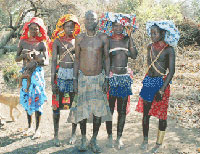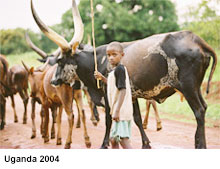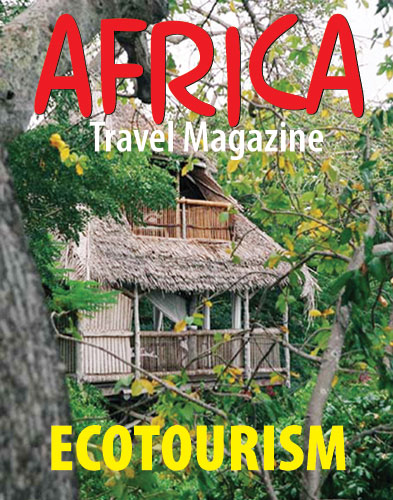
..../

|
Cultural Eco
Symposium: Cultural Eco
Symposium: Cultural Eco
Symposium: Cultural Eco
Symposium: OUR
YEARBOOK WILL FEATURE PHOTOS, ACTIVITIES AND
RESULTS OF THESE ATA ECOTOURISM
SYMPOSIA: 1992
- Saly / Dakar, Senegal 1994
- South Africa 1996
- Marrakech, Morocco 2000
- Abuja, Nigeria 2001-
Yaounde, Cameroon 2002
- Fez, Morocco 2003
- Zanzibar, Tanzania - 2004
- Kampala, Uganda 2005:
Luanda, Angola 2006
- Calabar, Nigeria 2008
-Djibouti Comments
from the North American Ecotourism Conference,
Madison, WI Africa's Goes
Green See views of
Nigeria's Abuja Carnival,.
by
Muguette Goufrani Click
here |
|
Cultural and EcoTourism Yearbook
Edition
Showcase of ATA Ecotourism Symposia
Host Countries
Global Organizations Supporting
Ecotourism
The African Diaspora Heritage
Trail Ethiopia Millennium Supplement Africa's Top 10 Vacations ATA Ecotourism Manifesto
FEZ DECLARATION
It was agreed that:
1. There should be concerted efforts to stimulate,
educate, and involve, through direct partnership,
local communities in Ecotourism products which will
affect their lives. That this involvement of the
local communities must include consistent ethical
practices which will provide full respect of their
unique cultural, religious, linguistic and personal
integrity. 2. That all ground
operators; tour operators, travel agents and group
organizers are encouraged to include
community-based tourism projects in their proposed
programs. 3. All tourism
institutions participating in the Cultural Heritage
and Ecotourism sector should compile and make
public some form of a stated Environmental Policy
for their organization, with specific conditions
for its implementation and updating. 4. All tourism
institutions participating within the areas of
Cultural Heritage and Ecotourism should strive to
achieve, in the immediate future, products of an
equivalent quality to recognized and certified
international standards, and that those standards
are regularly controlled for the maintenance of the
unique products and services demanded by Ecotourism
clients. 5. All tourism
institutions participating in the Cultural Heritage
and Ecotourism sector, should take intentional and
substantial steps toward the quality training of
all staff and personnel for the specific needs of
Cultural Heritage and Ecotourism clients, and that
there should be a clearly defined relationship of
the tourism industry with youth employment and
educational awareness programs; with an emphasis on
cultural and environmental issues. 6. All tourism
institutions participating in the Cultural Heritage
and Ecotourism sector should implement specific
educational programs on the diversity and quality
of ecologically-oriented products for field
guides and management personnel regarding products
acquisition and ongoing management
policy. 7. All tourism
institutions participating in the Cultural Heritage
and Ecotourism sector, should take significant
efforts to stimulate a public awareness for, and
take direct actions to implement, sustainable
conservation programs for water and other natural
resources, including the protection of flora and
fauna in the environment of their tourism
product. 8. The tourism
industry must recognize the significant
inter-relational role of Cultural Heritage and
Ecotourism within the broader aspects of a host
nation's full social, political and economic
systems. 9. That there must
be both a consistency of purpose and of commitment
for strategic linkage among the World Tourism
Organization, the nations of Africa and the
international travel industry to achieve the goals
outlined in this document, and dealing with the
delicate balance between commercialization and
conservation of Africa's heritage and
environment. 10. That the ATA
should reactivate their Environment Committee, and
further deputize this group to identify, propose
and These committed
recommendations, to be called The Fez Declaration
for Responsible Travel Action, after extensive
discussions have been agreed to by the delegates of
the Sixth Cultural Heritage and Ecotourism
Conference, Fez, Morocco, on March 30,
2003. |
 See
testimonials at top of this page Read what
Terry Jenkins
of Africa's Top 10
Vacations says about our website
See
testimonials at top of this page Read what
Terry Jenkins
of Africa's Top 10
Vacations says about our website





 From
the Editor: “Our greatest Cultural and
Ecotourism issue ever.
From
the Editor: “Our greatest Cultural and
Ecotourism issue ever. African
Leaders in the Spotlight
African
Leaders in the Spotlight ATA
Ecotourism Manifesto
ATA
Ecotourism Manifesto implement
reasonable measures to move ATA into the
Responsible Travel mainstream in a leadership
capacity, including concrete actions such as
screening of conference venues, to insure that host
facilities comply with Cultural Heritage and
Ecotourism standards.
implement
reasonable measures to move ATA into the
Responsible Travel mainstream in a leadership
capacity, including concrete actions such as
screening of conference venues, to insure that host
facilities comply with Cultural Heritage and
Ecotourism standards.